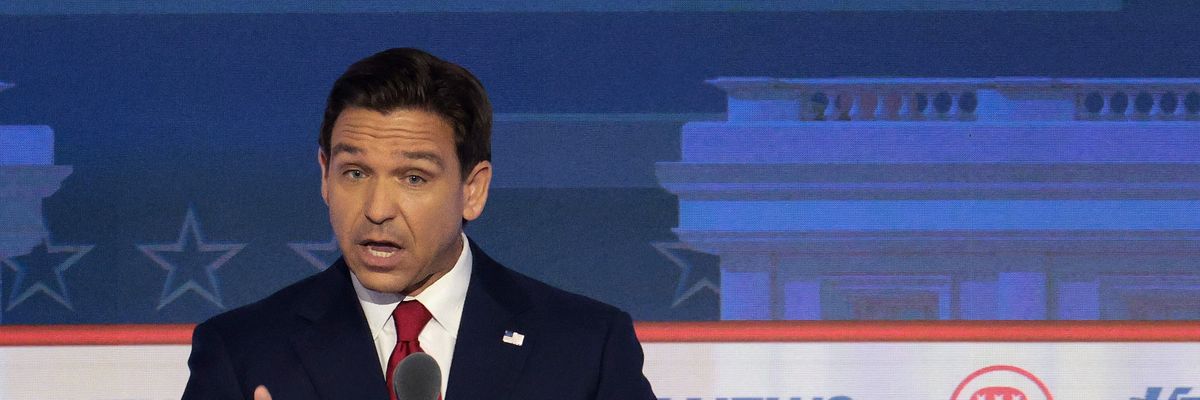Reproductive rights advocates on Wednesday night vowed that Republican presidential candidates will not succeed as they try to "hide the ball" regarding their plans to ban abortion care nationwide, despite the attempts of contenders including Florida Gov. Ron DeSantis and former United Nations Ambassador Nikki Haley at the first GOP debate.
When asked whether he would sign a federal ban like the one proposed by Sen. Lindsey Graham (R-S.C.) last year, DeSantis said only that he would "stand on the side of life" and did not respond directly, while Haley claimed Americans can find "consensus" on a number of other pro-forced pregnancy measures, argued a broad ban is unlikely to get through Congress, and did not say whether she would sign it if passed.
Haley, said Planned Parenthood Votes, has recently made clear that she would in fact sign a federal abortion ban if it passed in Congress.
In May, the group noted, Haley told reporters, "Yes, of course I would sign" the legislation when asked about it. As governor of South Carolina, she also signed an abortion ban that included no exceptions for survivors of rape or incest.
"Voters know that every GOP candidate running for president would sign a national abortion ban if given the opportunity," Shwetika Baijal, a spokesperson for Planned Parenthood Votes, said in a statement. "Some, like
Mike Pence, are proudly boasting about their plan to ban abortion nationwide. Because they know banning abortion is unpopular, others are trying to hide their true agenda and downplay their goals to restrict access to abortion however they can. Despite their desperate attempts tonight, we know their records and we know the truth."
Polls have shown all eight candidates who were at the debate are significantly trailing the GOP front-runner, former President Donald Trump, who declined to participate in the event and worked to restrict reproductive rights while in office.
DeSantis signed a Florida bill in April that would ban abortion at six weeks of pregnancy—before many people even know they're pregnant. He told voters in Iowa last month that he would "sign pro-life legislation," suggesting he would approve a nationwide abortion ban.
Haley repeated the nonmedical term "late-term abortion" and suggested that banning abortions later in pregnancy is a reasonable, broadly popular alternative to a nationwide abortion ban. Abortions after about 21 weeks of pregnancy make up about 1% of abortions and are most often sought by people who face life-threatening conditions, fetal anomalies, or who are 14 and under and face barriers to care, according to the Centers for Disease Control and Prevention.
"Like Nessie and Bigfoot, the term 'late-term abortion' is completely made up," Planned Parenthood President and CEO Alexis McGill Johnson said ahead of the debate. "It's anti-abortion propaganda with no basis in medicine, intended to confuse people."
Polling released by PerryUndem last month showed that following the reversal of Roe v. Wade, a rapidly growing share of Americans believe there should be no restrictions on the point at which a pregnant person can obtain abortion care. Fifty-five percent of women between the ages of 18 and 44 said there should be no restrictions and 70% of Democratic voters said the same—a marked change compared to five years ago, according to the nonpartisan research firm.
"Ten years ago, even five years ago, people would for sure have supported a viability requirement," Tresa Undem, a co-founder of PerryUndem, told FiveThirtyEight. "People are saying, 'I don't want the government involved in this at all.'"
Numerous cases in states such as Texas and Oklahoma have garnered national attention since Roe was overturned by the U.S. Supreme Court last year, with patients struggling to obtain abortions later in their pregnancies despite threats to their health and lives.
"They want to make abortion later in pregnancy into this bogeyman but there's never been better proof of how necessary it is than the stories coming out of states with abortion bans," said author and advocate Jessica Valenti.
NARAL Pro-Choice America accused Haley of "pretending to be a moderate on abortion" by saying all Americans can agree "that contraception should be available" and "that we are not going to put a woman in jail or give her the death penalty if she gets an abortion."
"That's what they want us to be grateful for,"
said Valenti. "We'll keep birth control legal and won't kill you for having an abortion."




